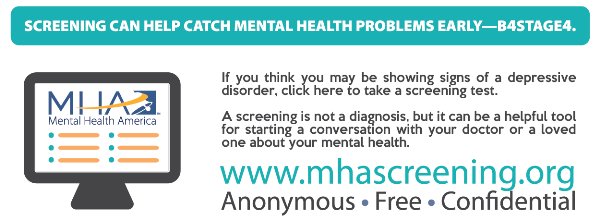You are here
National Depression Screening Day
Take an online depression screening. MHA's screening tools are free, anonymous, and confidential.
Whether for heart disease, high blood pressure, diabetes or depression, health screenings provide a quick and easy way to spot the first signs of serious illness and can reach people who might not otherwise seek professional medical advice.
Major depression is one of the most common mental illnesses, affecting 6.7% (more than 16 million) of American adults each year.[1]
Like screenings for other illnesses, depression screenings should be a routine part of healthcare.
Why Screen for Depression?
- Clinical depression is a serious medical illness.
- Clinical depression can lead to suicide.
- Sometimes people with depression mistakenly believe that the symptoms of depression are a "normal part of life."
- Clinical depression affects men and women of all ages, races and socioeconomic groups.
- Only about a third (35.3%) of those suffering from severe depression seek treatment from a mental health professional.[2]
- Depression can co-occur and complicate other medical conditions.
- Screenings are often the first step in getting help.
Who Should Get Screened?
People suffering from depression often experience some of these key symptoms:
- A persistent sad, anxious or "empty" mood
- Sleeping too little, early morning awakening, or sleeping too much
- Reduced appetite and weight loss, or increased appetite and weight gain
- Loss of interest or pleasure in activities once enjoyed
- Restlessness or irritability
- Difficulty concentrating, remembering or making decisions
- Fatigue or loss of energy
- Thoughts of death or suicide
Screenings are not a professional diagnosis. Screenings point out the presence or absence of depressive symptoms and provide a referral for further evaluation if needed. You should see your doctor or a qualified mental health professional if you experience five or more of these symptoms for longer than two weeks or if the symptoms are severe enough to interfere with your daily routine.
Learn more about depression on mentalhealthamerica.net:
Co-occurring Disorders and Depression
Sources
[1] Substance Abuse and Mental Health Services Administration, Results from the 2013 National Survey on Drug Use and Health: Mental Health Findings, NSDUH Series H-49, HHS Publication No. (SMA) 14-4887. Rockville, MD: Substance Abuse and Mental Health Services Administration, 2014.
[2] Pratt LA, Brody DJ. Depression in the U.S. household population, 2009–2012. NCHS data brief, no 172. Hyattsville, MD: National Center for Health Statistics. 2014.[2] Pratt LA, Brody DJ. Depression in the U.S. household population, 2009–2012. NCHS data brief, no 172. Hyattsville, MD: National Center for Health Statistics. 2014.









this page